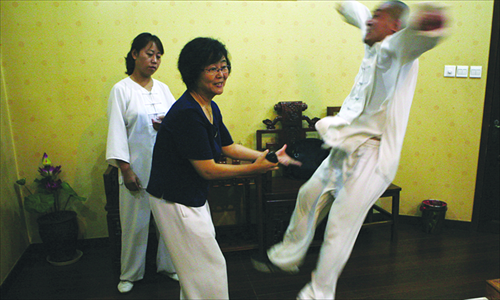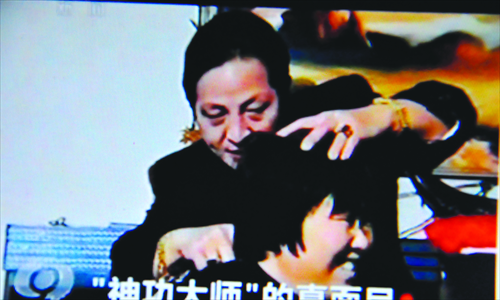Qigong ‘masters’ struggle to survive

Self-proclaimed tai chi master Yan Fang demonstrates how she can easily push a follower away using qigong. Photo: IC

Video footage shows self-proclaimed qigong master Wang Lin treating a patient. Photo: IC
At this moment, he could have been seated leisurely in his mansion or driving his Hummer SUV, talking cheerfully with visiting admirers from political, business or showbiz circles. Instead, "exhausted" and "ill," he has shut himself away in Hong Kong, seeking to escape potential disturbances and investigations.
But he seems to have failed to make these troubles disappear in spite of possessing self-proclaimed spiritual powers, which he boasts can cure incurable diseases and even kill a person at long distance.
Wang Lin, 61, a millionaire who made his fortune out of self-proclaimed qigong mastery, has recently met with public outrage and scrutiny surrounding his "supernatural power," alongside accusations of swindling, illegal medical practice, illegal gun ownership and bribery.
The case has brought pseudo-masters who claim to have special abilities back into the spotlight.
Following an anti-superstition campaign in the late 1990s and early 2000s, most "qigong" sects, including those which claimed millions of followers, were declared illegal and disbanded, while their masters were detained or fled overseas.
Before Wang Lin was exposed to have been living an even more elevated, though "low-key," life in Luxi county, Jiangxi Province, many people may have thought the supernatural qigong practice had almost died out. Now they realized the smarter con artists have only sharpened their strategies and survived.
Nevertheless, experts say it is indisputable that the survival space for these fake masters is shrinking.
Smaller targets
Differing from previous "masters" who expanded membership in a top-down fashion among the masses, the ones today like Wang Lin prefer to exclusively target the elite.
According to the Beijing News, in Wang Lin's five-story villa in Luxi, halls on two floors are devoted to pictures of Wang with high-level officials, leading film stars and business gurus.
Similarly, Taoist priest Li Yi, a self-proclaimed "health-preservation master," also had many influential and noted devotees, such as Alibaba's founder Ma Yun and pop singer Faye Wong.
Li, then the deputy head of the Chinese Taoist Association who faked a performance where he held his breath for two hours and 22 minutes underwater, began fading away from the public eye since July 2010, when his tricks were disclosed and he was accused of raping and having affairs with his female disciples.
Despite gaining popularity in elite circles, Wang and Li were barely known to the general public and even to most qigong practitioners.
"I had never heard of Wang or Li until the intense media coverage. Their self-claimed abilities are too shocking," commented Chen Xinmei, a teacher of qigong at Sias International University in Zhengzhou, Henan Province.
According to online videos and Wang's biography, through spiritual powers, he could make a snake appear from an empty container, help restore a snake's head that had been cut off and remove kidney stones from a patient.
In a statement issued on July 29, the China Emei Kung Fu Research Association also denied any association with Wang, who claimed to have been apprenticed at Emei Mountain, a renowned Buddhist and Taoist sanctuary.
"Earning money and fame under the banner of qigong is sad. It will help destroy people's belief in qigong," Chen told the Global Times.
Li Shudong, director of the non-profit United States Health Qigong Federation, agreed.
"I got to know Wang Lin from recent reports. I'm convinced that what he practices is not qigong at all. It's all just cheap tricks," Li told the Global Times. He has settled down in San Francisco for over 20 years and teaches tai chi at Stanford University and for leading technology companies like Intel, Google and Apple.
In Wang's hometown of Luxi county, most locals know him as a rich man with political connections, rather than as a "qigong master."
"I heard of his name and he is rich but I have no idea what he does," a courier responded.
"The people he dealt with were either officials or celebrities, not ordinary people. Few residents knew of his "extraordinary" powers," another resident, Zhang, told the Global Times.
Similar tricks
Many agreed that besides supernatural powers, these famous people were attracted by Wang's vast social connections. "They long for either health and longevity, or career promotion and prosperity," He Zuoxiu, 86, academician of the Chinese Academy of Sciences who has long been fighting to uncover fake qigong masters, told the Global Times.
He concluded that these "masters" have learnt to deal with only a select group of people as they know public demonstrations would come under scrutiny and expose their tricks.
Compared with similar figures in the 1980s and 1990s, Wang and Li are small fry, He said.
Zhang Hongbao was one such founder of Zhong Gong, a spiritual movement based on qigong that was later declared an evil cult and banned in 1999 after amassing 3 million devotees, according to He. People then were fascinated by Zhang's claimed power to cure cancer and disabilities such as blindness and deafness.
Another "qigong master," Yan Xin, who boasted that he could put out forest fires and change the trajectory of missiles had up to 2 million disciples.
Regarding these people's path to success, experts say they share something in common. At first, they usually preached at leading universities and scientific research institutions, winning over certain intellectuals. Gradually, more and more ordinary people joined and were brainwashed.
"At that time, followers of the various qigong sects came from nearly every walk of life, even including some top officials," He said.
He noted that antiquated ideology still ran deep and superstition was rife in the 1990s, with people spending 100 yuan for a ticket to listen to a speech by fake masters, even though their monthly income was no more than 50 yuan.
But such a period could not reappear today, since the national awareness about science has been greatly improved, he concluded.
"In recent years, at regular intervals fake masters have appeared. Nevertheless, they are on a small scale and can hardly influence the social order or development. They are bound to fail," He said.
Doomed to fail
In late 1990, several sects were declared as cults and banned and their founders were on the warrants, including Zhong Gong. Some leaders fled overseas, some were arrested, others went underground and more changed career paths.
The life for these surviving "masters" was not easy.
In July 2006, Zhang Hongbao died in a car accident in the US. Relying on anti-China activities, other fake qigong occasionally appear in foreign media.
Online search results show that Yan Xin, who went to the US in 1990, still keeps promoting his spiritual therapy in Western countries, giving lectures and writing research papers. But his website yanxinqigong.net has not been updated since 2002.
"In Western countries, there are also some who try to coax money by deceiving people in the name of qigong. But they would never gain solid long-term support. People have a basic immune system against fraud," Li Shudong said.
After media reports, Taoist Li Yi quit his post as deputy head of the Chinese Taoist Association and retreated from public life.
Facing wide controversies, Wang Lin fled to Hong Kong. To defend his innocence, he opened a Tencent Weibo account on July 30. In a long blog post, he argued that he never claimed to have "supernatural powers" and seldom used qigong to treat diseases.
"Treating a patient would greatly undermine my vigor and strength. Actually, I don't earn money from this," he said, explaining his wealth mainly came from his business investments in real estate.
"I firmly support the Chinese Communist Party, I love my country and I love my hometown," another post read.
However, many people have actually expressed gratitude toward Wang. Wang stated that in the past two decades he has spent 3 million yuan on average each year in donations to around 5,000 poor families in Luxi.
"He truly made donations here. He earned money from corrupt officials and rich celebrities and shared part of it with the poor. No matter where he used tricks or was a fraudster, he is a Samaritan in my eyes," the local resident named Zhang told the Global Times.
Real qigong
Li Shudong believes that the fake masters will have little influence on individual beliefs in qigong. But he does not rule out worries that some people will cast the entire practice into doubt.
"Qigong is scientific, not supernatural. In a narrow sense, qigong movements can enhance fitness and health. It's true that it can relieve physiological problems through psychological techniques," Li said, adding that the number of non-Chinese qigong practitioners is increasing.
Twenty years ago when he arrived in the US, qigong movements were scarcely seen in parks and the practitioners were nearly all Chinese. But now, foreigners are seen practicing qigong in many parks in major cities.
Chen Xinmei echoed this opinion.
"As the government-led promotion for normal qigong, as well as the deeper sense of Chinese culture growing in foreign countries, I'm convinced that more and more people in the world will recognize qigong and benefit from it," Chen said.
In order to regulate the study and practice of qigong, the Health Qigong Management Center, affiliated to the General Administration of Sport of China, was established in 2001.
According to statistics from the center, the health qigong centers reached 15,000 across the country and regular practitioners totaled more than 1.5 million by the end of last year.